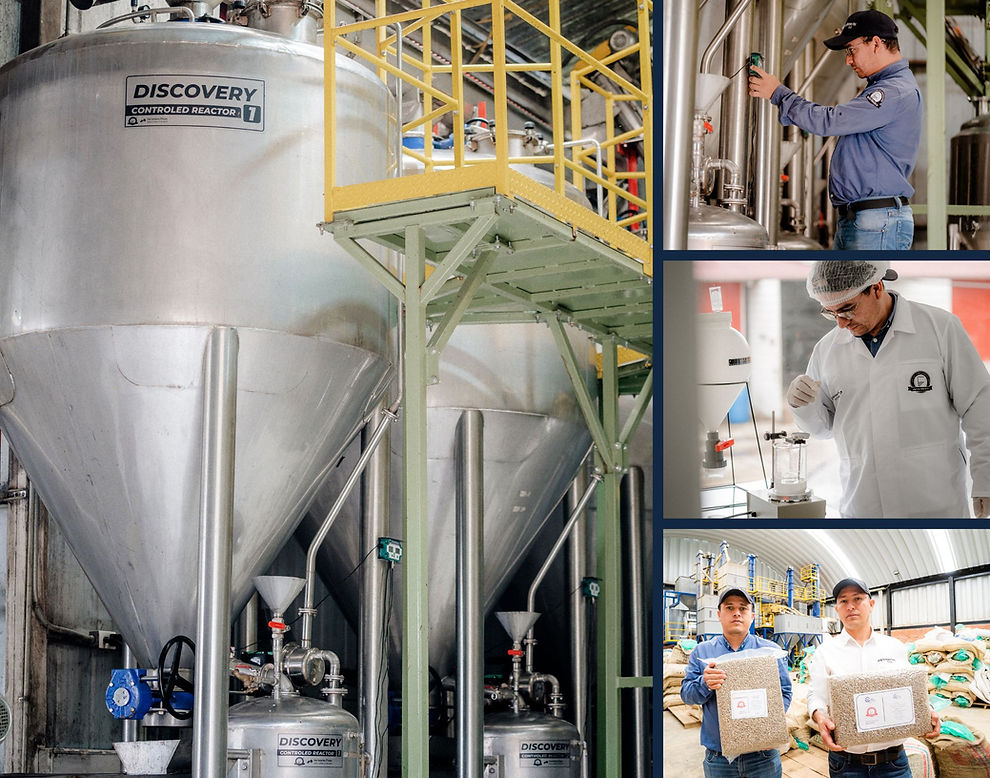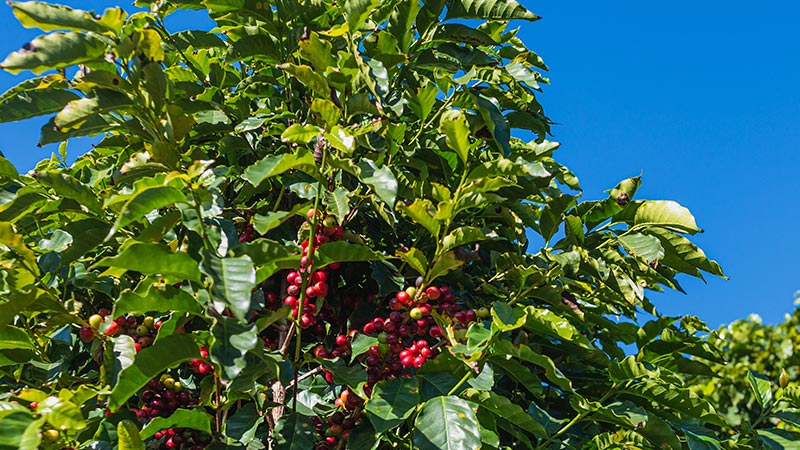Halfling - Half Caff - EA Decaf - Washed Thermal Shock Double Anaerobic/ Pulped Natural- Colombia/Brazil - Medium
Halfling - Half Caff - EA Decaf - Washed Thermal Shock Double Anaerobic/ Pulped Natural- Colombia/Brazil - Medium
Milk Chocolate, Strawberries, Candied Orange, Blueberry
Cauca, Colombia/ Carmo de Minas, Brazil
This half-caff blend brings together vibrant fruit notes from Wilton Benitez’s EA decaf with the smooth chocolate and almond tones of a Brazilian natural. Bright, balanced, and beautifully mellow.
Each Bag Contains Whole Coffee Beans
Couldn't load pickup availability
Granja El Paraiso 92
Washed Thermal Shock
Cauca, Colombia
Variety: Red Bourbon
Process: EA Decaf Washed with Thermal Shock
Fermentation: 48 Hours Anaerobic
Altitude: 2100 masl
Region: Cauca, Colombia
This Decaf lot from Wilton goes through whole cherry fermentation for 48 hours in an anaerobic environment. It is then washed and dried for 48 hours at 38 degrees Celsius.
The coffee is decaffeinated with Ethyl Acetate derived from cane sugar preserving the coffee's sweetness and natural character.
Producer: Wilton Benitez. 26+ years being a coffee grower. 16+ years of experience with specialty coffee. Roaster. Q-grader processor. Non-certified tester but with a lifetime of experience in the tasting process.
Paraíso 92 is a family farm that uses highly innovative farming systems such as terraces, drip irrigation, shading and laboratory nutrition count aimed to produce a unique coffee. Paraiso 92 has a processing plant, microbiology lab and quality lab. They are able to produce coffees through different processes such as washed, Natural, Honey and
anaerobic coffees (single and twice fermentation).
Located in a strategic spot close to the equator where historically the best coffees of the world have been found. There is an important characteristic with the coffees harvested near the equator and it is the fact that these coffees are exposed to more sunlight allowing them to grow in greater heights above sea level, resulting in higher quality coffees.
Average relative humidity: 70
Average sunlight hours (no clouds, no rain, etc.): 6
Thermal amplitude greater than 10° with minimum temperature of 13° and maximum temperature of 32° this enables a higher sugars contents in the coffee grain.
Height above sea level: 1950 mts
Soil: Volcanic soil close to the Puracé Volcano, high nutritional contents that favors the growing conditions.
Varieties: Bourbon, Tabi, Geisha, Castillo, Typica and Caturra among others.
In terms of technology, all the equipment and machinery is designed by the producer, assembled in the farm by him with the help of his brother.
The use of bioreactors and specific microorganisms for controlled fermentation coupled with a constant control and monitoring of factors such as temperature, pH, brix degrees and electric conductivity make El Paraiso 92´s coffee to stand out from the rest and offer a value added like no other. All this allow the producer to have distinct, unique and standardized profiles and notes.
Drying machines at the farm don’t use fossil fuels and only need moderate electric energy for their operation avoiding greenhouse gas emissions.
Fermentation Process:
The processes applied to all the coffees start with a careful and strict selection, sterilization and coffee cherry profiling. Subsequently, the first controlled anaerobic fermentation phase initiates, by a specific microorganism for each process. Later on, the coffee is pulped and then subject to a second fermentation phase. When the second fermentation phase is done, a thermal shock process is carried out through hot and cold-water shots in an effort to improve and boost the organoleptic characteristics of the coffee.
Drying machines at the farm don’t use fossil fuels and only need moderate electric energy for their operation avoiding greenhouse gas emissions.
1900 meters
1. Manual harvest.
2. Selection by size.
3. Selection by density.
4. Sterilization with ozonated wáter.
5. Sterilization with ultraviolet light.
6. Cherry fermentation for 48 hours.
7. During cherry fermentation we add yeast (Saccharomyces pastorianus).
8. Pulped Cherry.
9. Fermentation for 68 hours.
10. During cherry fermentation, natural grain juices are produced that are incorporated
in the second fermentation after pulping.
11. Washed.
12. Drying for 48 hours at 38 degrees centigrade
13. Decaffeinated with cane sugar
Fazenda Santa Lucia
Carmo de Minas,Brazil
Hélcio Carneiro Pinto
Variety: Yellow Bourbon
Process: Pulped Natural
Altitude: 900-1250 masl
Region: Carmo de Minas, Brazil
Farm: Fazenda Santa Lucia
Fazenda Santa Lucia producer Hélcio Carneiro Pinto has been working in coffee since he was 15 years old, helping his mother produce and process crops.
In 1976, Hélcio married Glycia Pereira Carneiro and began to manage Santa Lucia. In the 1990's, Hélcio was one of the founders of Aprocam, a group of pioneers that began a movement for the pursuit of quality coffee in the region of Carmo de Minas. Aprocam introduced the idea of processing pulped naturals on Carmo de Minas and Hélcio was the first producer to get the machines for this process.
Since that development at Santa Lucia, Hélcio has worked with universities and scientists, and he has taken trips to other coffee producing countries to further his knowledge on the production of specialty coffee. Today, Hélcio and Fazenda Santa Lucia maintain a worldwide reputation for quality Brazilian coffees. Fazenda Santa Lucia is 740 hectares with 100 hectares of coffee: Yellow Bourbon, Yellow Catuai, and Acaia.
This is a model farm of the Carmo de Minas region and is innovating in both quality and production methods with hopes of producing 4500 bags in the future.









































